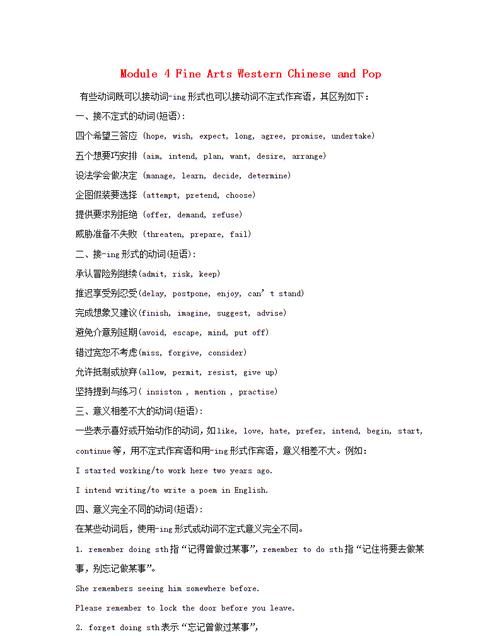本文目录
动名词的用法
动名词,指的是动词ing形式的一种,兼有动词和名词特征的非限定动词。它可以支配宾语,也能被副词修饰。动名词有时态和语态的变化。英语中的动名词是由动词变化而来。
1) 动名词做主语时,谓语动词为单数
2) 在动名词和不定式中,作为介词的宾语是动名词
3) 动名词的否定直接在其前加否定词,通过代词的宾格或所有格形式给出逻辑主语
问问题之前好好搞清楚什么是动名词

英语动名词的用法总结PPT
英语动名词的用法总结如下:
一、动名词的构成同现在分词。
1、直接加ing。
2、去掉不发音的e加ing。
3、双写结尾辅音字母加ing。
注:要满足重读、闭音节、结尾是一个辅音字母、辅音字母前是一个元音字母这些全部条件才能双写加ing。
4、tie、die、lie把ie变y加ing。

二、能带动名词作宾语的动词和短语初中有以下:finish、enjoy、mind、practice、consider、suggest、imagine、avoid等。短语主要是一些动副短语和系形短语。如give up、keep on、put off、be busy doing、be worth doing等。还有一些动宾短语如have fun doing、have trouble/difficulty(in)doing等。总结如下口诀便于记忆:
完成练习值得忙(finish,practice,be worth,be busy)。
继续习惯别放弃(keep on,be used to,give up)。
考虑建议不禁想(consider,suggest,can’thelp,feel like)。
喜欢思念要介意(enjoy,miss,mind)。

初中英语动名词的用法
初中英语动名词的语法
第五节 动名词

1.动名词的形式:
动名词是由动词原形+ing构成(如writing),有完成时态和被动语态(如having written,being written)。
2.动名词的用法
动名词通常在句中作主语和宾语。
1)动名词作主语
Going to the college is the little boy's dream.
Keeping studying hard will make you pass the exam.
2)动名词作宾语
有些动词后面只能带动名词作宾语,不能带不定式作宾语。此类动词常见的有:admit,acknowledge,anticipate,appreciate,avoid,consider,contemplate,defer,delay,deny,detest,dislike,ensure,enjoy,escape,excuse,evade,facilitate,fancy,favour,finish,forbid,imagine,include,keep,mind, miss,postpone,practise,resent,resist,risk,suggest,quit,worth等。例如:
1.John was considering buying a new car.
2.I hope you didn’t contemplate coming with us on this trip.
3.The witness denied having seen the accused man.
4.I would appreciate your keeping it a secret.
3)某些短语后面只能接动名词,不能接不定式。
此类短语常见的有:be (get) used to, be accustomed to, be dedicated to, be devoted to,be busy,be committed to,be suject to,cannot help, cannot resist,cannot stand,confess to,feel like,give up,have trouble(in), have difficulty(in),have a good/hard time(in),have fun(in),have an objection to,it is no good/use,keep on,insist on,look forward to,object to,pay attention to,put off,resort to,succeed in等。例如:
1.I cannot stand getting up early in the morning.
2.I have no difficulty (in) reaching the top of the mountain.
3.There is no use staying on.
4.I cannot resist (his) bargaining.
5.Although punctual himself,the professor was quite used to students’being late for his lecture.
4)动词或短语后面也可以接动名词的被动形式 。用主动形式还是被动形式,要根据句子的意思而定。例如:
a.Carlos just missed being caught.
b.That person wore dark glasses to avoid being recognized.
c.I object to being treated like a child.
3.另一类动词后面可以带动名词做宾语,也可以带不定式作宾语 。这类动词又可以分为两种:
1)带动名词作宾语与带不定式作宾语而意义无多大区别的动词
a) 在begin,cannot bear,cease,continue,dread,like,love,neglect,omit,prefer,propose等动词之后,如表一般的行为,用动名词作宾语为多;如表示特定的或具体的动作,则用不定式结构作宾语为多。例如:
1.I don’t like swimming.
2.I don’t like to swim this afternoon.
3.John prefers doing it his way.
4.John prefers to go outing tomorrow.
b) 在begin, start等动词之后,如表示有意的动作,用动名词结构为多;如表示无意的动作,用不定式结构为多。例如:
1.After some hesitation,he began speaking out his own opinion.
2.It has already begun to rain.
c) 在attempt,intend,plan等动词之后,用不定式结构与用动名词结构意义相同,但以用不定式较为常见。例如:
1.He intended to buy a new car.
2.He intended travelling abroad next summer.
d) 在encourage,permit,allow,recommend,advise,authorise等动词之后,一般用动名词作宾语,或者用不定式作宾语补足语。即:
encourage/permit/allow/recommend/advise/authorise+doing,或encourage/permit/allow/recommend/advise/authorise+somebody+to do。例如:
1.He advised going out for a walk.
2.He advised us to go out for a walk.
e) 在agree,decide等动词之后,可以直接跟不定式结构,但如果跟动名词,则动词后必须加适当的介词。例如:
1.He agreed to do me a favor.= He agreed on doing me a favor.
2.In the end the manager decided to double the advertising budget.=
3.In the end the manager decided on doubling the advertising budget.
f) 在need,want,require, deserve等动词之后,可以用动名词的主动形式表示被动意义,这相当于用不定式的被动形式。例如:
1.The house needs repairing. = The house needs to be repaired.
2.The disabled deserve respecting. = The disabled deserve to be respected. 2)带动名词作宾语与带不定式作宾语而意义不同的动词 a) 动词remember,forget后可以跟不定式或动名词,但意义有明显区别:跟动名词,其动作发生在“记得”或“忘记”的动作之前;跟不定式,其动作发生在“记得”或“忘记”的动作之后。试比较:
1.I remember posting this letter.我记得这封信已经寄出了。
2.I remember to post this letter in the afternoon. 我记得下午要将这封信寄走。
b) 动词regret后可以跟不定式或动名词,但意义有明显区别:
regret doing:为做过的事感到抱歉
regret to do:为即将要做的事感到抱歉
试比较:I regret to say that I can not go with you after school.
I regret having criticized you seriously in class.
c) 动词try,mean,can not help,used to后跟不定式还是动名词,取决于这些动词本身的含义。例如:
1.You should try to answer the questions by yourself.(try to do:设法或努力去做)
2.We try using this new method.(try doing:试着做某事)
3.I meant to go to the exhibition but I forgot. (mean to do:is算做某事)
4.Success means working very,very hard.(mean doing:意味着做某事)
5.I can't help apologizing. (can not help doing:忍不住做某事)
6.I can't help to apologize for him. (can not help to do:不能帮助做某事)
7.Mr.Smith used to jog in the morning,but now he has stopped.(used to do:过去经常或总是干某事)
8.Inland canals are used to ship farm and factory goods to nearby towns.(be used to do:被用来干某事)
9.I am not used to getting up early in the morning.(be/get used to doing: 习惯于干某事)
d) 动词stop,continue,go on,leaveoff之后,通常用动名词结构作宾语;如果用不定式结构,则不是宾语而是目的状语,相当于in order to。试比较:
1.They stopped working.他们停止工作(来做其他事)。
2.They stopped to work。他们停止(做其他事)来工作。
3.The students went on reciting the text.学生们继续背诵课文。
4.The students went on to recite the text.学生们停下其他事,继续背诵课文。
5.She let off doing the housework.她停止做家务(去干其他事)。
6.She let off to do the housework.她停止(干其他事)来做家务。
动名词的逻辑主语问题
动名词,顾名思义,具有名词的.特点,即可以加物主代词和名词的属格来表示其逻辑 (这时动名词的逻辑主语与句子主语不一致)。如果动名词的逻辑主语就是句子主语,不用加物主代词或名词的属格。例如:
1.The watchman reported finding the door open.=
2.The watchman reported that he had found the door open.
此处,finding的主语与主句主语一致,都是the watchman,所以finding前不加物主代词。
I appreciated very much your helping me through the tough period.
此处,helping的主语是you,而主句的主语是I,两者不一致,所以helping前的物主代词your不能省略。
一般说来,能带动名词作宾语的动词都可以根据语义意图在动名词之前加上或略去主语。但有些动词,如excuse,forgive,pardon等,其后的动名词结构总是带有逻辑主语。这些逻辑主语通常由名词或代词宾格表示,也可由名词属格或形容词性物主代词表示。
1.I do mind people smoking in public places.(名词宾格作逻辑主语)
2.We don't understand him needing so much money.(代词宾格作逻辑主语)
3.I will never forgive his betraying me by breaking his promise.(物主代词作逻辑主语)
1.Mary excused the boy’s upsetting the ink.(名词属格作逻辑主语)
;英语动名词怎么用
动名词的用法是:在句子中作主语、宾语、表语、定语。
1. 作主语
动名词作主语时谓语动词用第三人称单数形式。如:Playing basketball is my hobby. 打篮球是我的爱好。
当表语是 no good, no use 等时,常用 it 代替动名词作主语。如:It is no good crying here.在这儿哭是没用的。
2. 作宾语
某些动词后只能接动名词作宾语,这类动词常见的有:admit,risk,envy,appreciate,forgive,escape,finish等。
例如:He didn't admit having broken the window. 他不承认是他打碎的窗户。
动名词也可以作介词的宾语。
如: The significance of learning English is to become an internationally able person. 学习英语的意义在于成为一名国际化的人才。
3. 作表语
当动名词作表语的时候,可以和主语调换位置。如:My hobby is reading books.= Reading books is my hobby. 我爱好阅读。
4. 作定语
动名词作定语,一般表示用途。如:a waiting room, 意为“候车室”; a reading room, 意 为“阅览室”;a dining room, 意为餐厅。

以上就是关于英语动名词的用法总结,动名词的用法的全部内容,以及英语动名词的用法总结 的相关内容,希望能够帮到您。

